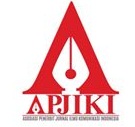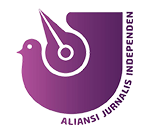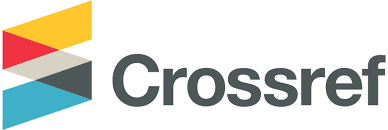Content Analysis of MAFINDO's Verified WhatsApp-Related Misinformation in Indonesia
Abstract
Keywords
Full Text:
PDFReferences
Adiprasetio, J., Rahmawan, D., Wibowo, K. A., Yudhapramesti, P., & Hartoyo, N. M. (2024). Epistemological problems in fact-checking practice: Evidence from Indonesia. Media Practice and Education, 1–22. https://doi.org/10.1080/25741136.2024.2341338
Ajengrastri, A. (2019). Indonesian survey explores the spread of misinformation on WhatsApp. Ijnet.Org. https://ijnet.org/en/story/indonesian-survey-explores-spread-misinformation-whatsapp
Amazeen, M. A. (2013). Making a difference? A critical assessment of fact-checking in 2012. New America Foundation. https://static.newamerica.org/attachments/10215-making-a-difference/Amazeen_-A_Critical_Assessment_of_Factchecking.4a3289cb3fcd4a8faf0d94f40ebcdc35.pdf
Amazeen, M. A. (2015). Revisiting the epistemology of fact-checking. Critical Review, 27(1), 1–22. https://doi.org/10.1080/08913811.2014.993890
Amazeen, M. A. (2019). Practitioner perceptions: Critical junctures and the global emergence and challenges of fact-checking. International Communication Gazette, 81(6–8), 541–561. https://doi.org/10.1177/1748048518817674
Baulch, E., Matamoros-Fernández, A., & Suwana, F. (2024). Memetic persuasion and WhatsAppification in Indonesia’s 2019 presidential election. New Media & Society, 26(5), 2473–2491. https://doi.org/10.1177/14614448221088274
Cheruiyot, D., & Ferrer-Conill, R. (2018). “Fact-checking Africa.” Digital Journalism, 6(8), 964–975. https://doi.org/10.1080/21670811.2018.1493940
Fakida, A. (2021). Political fact-checking in the Middle East: What news can be verified in the Arab world? Open Information Science, 5(1), 124–139. https://doi.org/10.1515/opis-2020-0117
Freelon, D. (2013). ReCal OIR: Ordinal, interval, and ratio intercoder reliability as a web service. International Journal of Internet Science, 8(1), 10–16. https://dfreelon.org/publications/2013_ReCal_OIR_Ordinal_Interval_and_Ratio_Intercoder_Reliability_as_a_Web_Service.pdf
Graves, L. (2016). Deciding what’s true: The rise of political fact-checking in American journalism. Columbia University Press.
Graves, L. (2017). Anatomy of a fact check: Objective practice and the contested epistemology of fact checking. Communication, Culture & Critique, 10(3), 518–537. https://doi.org/10.1111/cccr.12163
Harcup, T., & O’Neill, D. (2001). What is news? Galtung and ruge revisited. Journalism Studies, 2(2), 261–280. https://doi.org/10.1080/14616700118449
Harcup, T., & O’Neill, D. (2017). What is news? Journalism Studies, 18(12), 1470–1488. https://doi.org/10.1080/1461670X.2016.1150193
Hassan, N., Adair, B., Hamilton, J., Li, C., Tremayne, M., Yang, J., & Yu, C. (2015). The quest to automate fact-checking. http://cj2015.brown.columbia.edu/papers/automate-fact-checking.pdf
Hayes, A. F., & Krippendorff, K. (2007). Answering the call for a standard reliability measure for coding data. Communication Methods and Measures, 1(1), 77–89. https://doi.org/10.1080/19312450709336664
Hui, J. Y. (2020). Social media and the 2019 Indonesian elections: Hoax takes the centre stage. In Southeast Asian Affairs 2020 (pp. 155–172). ISEAS Publishing. https://doi.org/10.1355/9789814881319-010
Johnston, J., & Gulliver, R. (2022). Public interest communication. The University of Queensland.
Jumranaa, Partinib, & Wastutiningsih, S. P. (2020). Netizen participation in the counter narrative of the anti-hoax movement in Indonesia. International Journal of Innovation, Creativity and Change, 13(1), 569–582. https://www.ijicc.net/images/vol_13/13149_Jumrana_2020_E_R.pdf
Krisdinanto, N. (2024). Metajournalistic discourse on the commercialization of news: Resistance toward journalistic autonomy. Jurnal Kajian Jurnalisme, 7(2), 98–111. https://doi.org/10.24198/jkj.v7i2.48238
Lelo, T. (2022). The rise of the Brazilian fact-checking movement: Between economic sustainability and editorial independence. Journalism Studies, 23(9), 1077–1095. https://doi.org/10.1080/1461670X.2022.2069588
Lim, C. (2018). Checking how fact-checkers check. Research & Politics, 5(3). https://doi.org/10.1177/2053168018786848
Lim, M. (2017). Freedom to hate: Social media, algorithmic enclaves, and the rise of tribal nationalism in Indonesia. Critical Asian Studies, 49(3), 411–427. https://doi.org/10.1080/14672715.2017.1341188
López-García, X., Costa-Sánchez, C., & Vizoso, Á. (2021). Journalistic fact-checking of information in pandemic: Stakeholders, hoaxes, and strategies to fight disinformation during the COVID-19 crisis in Spain. International Journal of Environmental Research and Public Health, 18(3), 1227. https://doi.org/10.3390/ijerph18031227
Mardjianto, F. L. D., Pandji, Y., & Indrasari, T. M. (2022). Fact-check audience in Indonesia 2022. https://turnbackhoax.id/wp-content/uploads/2023/12/Fact-Check-Audience-in-Indonesia-2022-7.pdf
Micallef, N., Armacost, V., Memon, N., & Patil, S. (2022). True or false: Studying the work practices of professional fact-checkers. Proceedings of the ACM on Human-Computer Interaction, 6(CSCW1), 1–44. https://doi.org/10.1145/3512974
Moreno-Gil, V., Ramon, X., & Rodríguez-Martínez, R. (2021). Fact-checking interventions as counteroffensives to disinformation growth: Standards, values, and practices in Latin America and Spain. Media and Communication, 9(1), 251–263. https://doi.org/10.17645/mac.v9i1.3443
Nieminen, S., & Rapeli, L. (2019). Fighting misperceptions and doubting journalists’ objectivity: A review of fact-checking literature. Political Studies Review, 17(3), 296–309. https://doi.org/10.1177/1478929918786852
Nieminen, S., & Sankari, V. (2021). Checking politifact’s fact-checks. Journalism Studies, 22(3), 358–378. https://doi.org/10.1080/1461670X.2021.1873818
Nurlatifah, M., & Irwansyah. (2019). Fact-checking journalism sebagai platform kolaborasi human and machine pada jurnalisme digital. Jurnal Komunikasi, 13(2), 121–134. https://doi.org/10.20885/komunikasi.vol13.iss2.art1
OECD. (2019). PISA 2018 assessment and analytical framework. OECD. https://doi.org/10.1787/b25efab8-en
Rahmawan, D., Garnesia, I., & Hartanto, R. (2023). Checking the fact-checkers: Analyzing the content of fact-checking organizations as initiatives for hoax eradication in Indonesia. Jurnal ASPIKOM, 8(2), 241–256. https://doi.org/10.24329/aspikom.v8i2.1267
Rahmawan, D., Hartanto, R., & Garnesia, I. (2022). Multi case analysis on the development of fact-checking organizations in Indonesia. Jurnal Kajian Komunikasi, 10(1), 14–28. https://doi.org/10.24198/jkk.v10i1.38752
Recuero, R., Soares, F. B., Vinhas, O., Volcan, T., Hüttner, L. R. G., & Silva, V. (2022). Bolsonaro and the far right: How disinformation about COVID-19 circulates on Facebook in Brazil. International Journal of Communication, 16, 148–171. https://ijoc.org/index.php/ijoc/article/view/17724/3631
Redaksi CNBC Indonesia. (2019). Whatsapp-medsos dibatasi pemerintah sampai 25 Mei 2019. CNBC Indonesia. https://www.cnbcindonesia.com/tech/20190522144725-37-74298/whatsapp-medsos-dibatasi-pemerintah-sampai-25-mei-2019
Safitri, P. N., Astuti, S. I., Hidayah, N., Suryani, C., Wasdiana, M. D., & Wahid, A. (2022). When politics and religion become disaster: An annual mapping of hoax in Indonesia. Ultimacomm: Jurnal Ilmu Komunikasi, 13(2), 343–357. https://doi.org/10.31937/ultimacomm.v13i2.2104
Singer, J. B. (2021). Border patrol: The rise and role of fact-checkers and their challenge to journalists’ normative boundaries. Journalism, 22(8), 1929–1946. https://doi.org/10.1177/1464884920933137
Slijepčević, M., Holy, M., & Borčić, N. (2021). Media ecosystems and the fact-checking movement. Politička Misao, 58(2), 92–112. https://doi.org/10.20901/pm.58.2.04
Soraya, N. A., Gumilar, G., & Al-Faqih, M. Z. (2023). The meaning of citizen journalism ethics by citizen journalists of Tempo Witness in the Central Java Region. Jurnal Kajian Jurnalisme, 6(2), 185–199. https://doi.org/10.24198/jkj.v6i2.40985
Tandoc Jr., E. C., Rosenthal, S., Yeo, J., Ong, Z., Yang, T., Malik, S., Ou, M., Zhou, Y., Zheng, J., Mohamed, H. A. Bin, Tan, J., Lau, Z. X., & Lim, J. Y. (2022). Moving forward against misinformation or stepping back? Whatsapp’s forwarded tag as an electronically relayed information cue. International Journal of Communication, 16, 1851–1868. https://ijoc.org/index.php/ijoc/article/view/18138/3740
Tyson, A., & Purnomo, B. (2017). President Jokowi and the 2014 Obor Rakyat controversy in Indonesia. Critical Asian Studies, 49(1), 117–136. https://doi.org/10.1080/14672715.2016.1258585
Uscinski, J. E., & Butler, R. W. (2013). The epistemology of fact checking. Critical Review, 25(2), 162–180. https://doi.org/10.1080/08913811.2013.843872
Vinhas, O., & Bastos, M. (2023). When fact-checking is not weird: Negotiating consensus outside western, educated, industrialized, rich, and democratic countries. The International Journal of Press/Politics. https://doi.org/10.1177/19401612231221801
Walter, N., Cohen, J., Holbert, R. L., & Morag, Y. (2020). Fact-checking: A meta-analysis of what works and for whom. Political Communication, 37(3), 350–375. https://doi.org/10.1080/10584609.2019.1668894
Weikmann, T., & Lecheler, S. (2023). Visual disinformation in a digital age: A literature synthesis and research agenda. New Media & Society, 25(12), 3696–3713. https://doi.org/10.1177/14614448221141648
Wibowo, K. A., Rahmawan, D., & Maryani, E. (2019). In Indonesia, young and old share fake news on social media. The Conversation. https://theconversation.com/in-indonesia-young-and-old-share-fake-news-on-social-media-111433
Winarno, B. (1997). Bre-X: Sebungkah emas di kaki pelangi. Inspirasi Indonesia.
Yee, A. (2017). Post-truth politics and fake news in Asia. Global Asia, 12(2), 66–71. https://www.globalasia.org/data/file/articles/bd578898a7c01489ee904d24f804e242.pdf
Zelizer, B. (1993). Journalists as interpretive communities. Critical Studies in Mass Communication, 10(3), 219–237. https://doi.org/10.1080/15295039309366865
Zhao, A., & Naaman, M. (2023). Insights from a comparative study on the variety, velocity, veracity, and viability of crowdsourced and professional fact-checking services. Journal of Online Trust and Safety, 2(1), 1–24. https://doi.org/10.54501/jots.v2i1.118
DOI: https://doi.org/10.24198/jkj.v8i1.54463
Refbacks
- There are currently no refbacks.
Copyright (c) 2024 The Author(s)

This work is licensed under a Creative Commons Attribution-NonCommercial-ShareAlike 4.0 International License.
Kajian Jurnalisme Indexed by:
Editorial Office of Kajian Jurnalisme:
Journalism Study Program, Faculty of Communication Sciences, Universitas Padjadjaran
Building 3 2nd Floor, Jl. Raya Bandung Sumedang KM.21, Jatinangor, Sumedang Regency, West Java 45363
Email: kajian.jurnalisme.fikom@unpad.ac.id
Telepon: (022) 7796954
Faks: (022) 7794122
Kajian Jurnalisme Supervised by:













